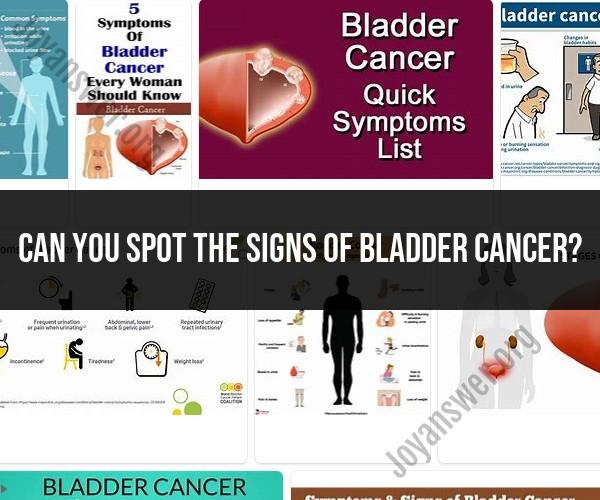Can you spot the signs of bladder cancer?
Detecting signs of bladder cancer early is crucial for improving treatment outcomes and overall prognosis. Bladder cancer can manifest with a variety of symptoms and signs, which can vary from person to person. Here are common signs to watch out for that might indicate the presence of bladder cancer:
1. Hematuria (Blood in Urine):The most common and noticeable sign of bladder cancer is blood in the urine, known as hematuria. It might appear pink, red, or brown and can be intermittent or continuous. Hematuria is often painless, but it's essential to seek medical attention if you notice any changes in urine color.
2. Changes in Urinary Habits:Be attentive to changes in urinary habits, including:
- Increased frequency of urination.
- Urgency to urinate.
- Difficulty starting or stopping urination.
- Feeling like you can't completely empty your bladder.
3. Pain or Discomfort:Bladder cancer might cause pain or discomfort, including:
- Pelvic pain.
- Lower abdominal pain.
- Pain during urination.
4. Back Pain:If bladder cancer has progressed or spread, it can cause lower back pain. If you experience persistent back pain without a clear cause, it's essential to consult a healthcare professional.
5. Fatigue and Weight Loss:Unexplained fatigue and unintentional weight loss can sometimes indicate the presence of cancer, including bladder cancer.
6. Infections and Irritation:Frequent urinary tract infections (UTIs) or bladder infections might be associated with bladder cancer, especially if they occur without clear triggers.
7. Visible Mass or Lump:In some cases, a visible mass or lump might be felt in the lower abdomen or pelvic area. However, this is less common and typically indicates more advanced disease.
8. Anemia:If blood loss due to hematuria is significant, it can lead to anemia, resulting in symptoms like fatigue and weakness.
9. Age and Risk Factors:Bladder cancer is more common in older individuals and those with risk factors such as a history of smoking, exposure to certain chemicals, and a family history of bladder cancer.
10. Routine Checkups:Regular checkups and screenings can help with early detection. If you're at a higher risk due to age or other factors, discussing bladder cancer screenings with your healthcare provider might be advisable.
Remember that these symptoms can also be caused by other conditions, and experiencing them does not necessarily mean you have bladder cancer. However, if you notice persistent or concerning symptoms, it's essential to consult a healthcare professional. Early detection and diagnosis significantly improve the chances of successful treatment and better outcomes.













